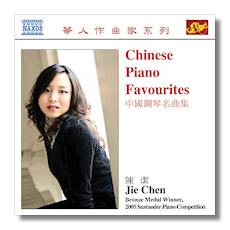
The Internet's Premier Classical Music Source
Related Links
- Latest Reviews
- More Reviews
-
By Composer
-
Collections
DVD & Blu-ray
Books
Concert Reviews
Articles/Interviews
Software
Audio
Search Amazon
Recommended Links
Site News
 CD Review
CD Review
Chinese Piano Favorites

- Tang Bi-guang: Liu Yang River
- Ren Guang: Silver Clouds Chasing the Moon
- Lu Wen-cheng: Autumn Moon Over the Calm Lake
- Hua Yan-jun: The Second Spring Bathed in Moonlight
- Zhe Jian-er: Celebrating Our New Life
- Ding Shan-de: Children Suite
- Wang Li-san: The Sound of Big Waves
- Traditional:
- A Hundred Birds Paying Respect to the Phoenix
- Flute and Drum at Sunset
- Glowing Red Morningstar Lilies
- Farewell
- Soldiers of the Southern Sea
Jie Chen, piano
Naxos 8.570602 DDD 66:25
When American President Nixon visited China in 1972, there was a limited exchange of arts between the two countries. A Chinese work for piano and orchestra known as The Yellow River Concerto consequently enjoyed a brief vogue in the West. Arranged by Yin Chengzong from a vocal work by Xian Xinghai, the work treats melodies the Western ear would describe as typically Chinese in the manner of a virtuosic concerto – not a very refined one, though! – by Rachmaninoff. What makes the concerto likeable even today is its naïveté – its seeming refusal to consider for even one moment that perhaps there was no need for Chinese composers to imitate Rachmaninoff. Indeed, China's most successful classical composers today have found their own path.
The back cover of this CD states that it "focuses on piano works from the Republican period (1911-1949)." Actually, that's only partly true. Most of the music was written during that period, but not for the piano. For example, Silver Clouds Chasing the Moon was composed by Ren Guong in 1935 for an ensemble of Chinese instruments, but it wasn't arranged for piano until 1975, by Wang Jian-zhong. Interestingly, most of the piano arrangements on this CD date from the 1970s. Did Nixon's visit somehow create the need for a Chinese piano repertoire? Other arrangers whose work appears on this CD are Chen Pei-xun, Li Ying-hai, and Chu Wang-Hua.
Unsurprisingly, given the time and place, these works are very "safe." Traditional or traditional-sounding melodies are presented in a style no more daring than that of middle-period Rachmaninoff or Debussy. This is music anyone could enjoy, and there's nothing wrong with that. This program can get a little sugary, and the emphasis is on tunes, and on displaying the pianist's skills: legato, rippling passage-work, ringing chords… the whole Romantic stock in trade, except for darker emotions. Atmosphere is not missing on this CD, but for a deep, penetrating portrait of the Chinese psyche, you will have to look elsewhere!
Jie Chen plays this music charmingly, and with a bright and clean sound. She was the Bronze Medal Winner at the 2005 Santander Paloma O'shea Piano Competition. She began her studies at the Shanghai Conservatory of Music and continued at the Curtis Institute in Philadelphia. Played with less imagination, this music could seem boring, but her phrasing – for example, playful in "Hide and Seek" from Children Suite, and both imposing and bell-like in The Sound of Big Waves (probably the finest work here) – kept me interested. The piano is given a bright, juicy sound, thanks to the engineers in the Toronto studios of the CBC.
Copyright © 2008 by Raymond Tuttle




















